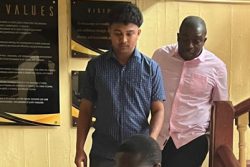A week last Wednesday, we reported on the contents of a press release issued by the Ministry of Education, which said that Minister Shaik Baksh was considering offering scholarships and special incentives for trained Mathematics and Science teachers as a means of promoting the two subject areas in schools. He was also reported as saying that the ministry was contemplating waiving the fees for students taking science subjects and Mathematics at the CSEC examinations. The statement went on to say that taken together with the non-graduation certificate course in the sciences which would qualify teachers who passed it for a salary increase, these measures were intended to give recognition to science and technology at the secondary school level.
The Minister, it seems, emphasized the importance of science, technology and agriculture in promoting national growth and development, a stance which can hardly be faulted. However, it must be observed that in the field of education, reforms take their time to trickle down through the system, and the benefit of innovations introduced now will not be fully felt for at least a couple of years, if not longer. In addition, all the factors involved in the decline of science in schools, would have to be addressed, and not just some of them, otherwise commendable initiatives might not produce the desired results, or could even fail altogether.
It is true that Minister Baksh said a National Science Co-ordinator had been appointed to promote sciences in schools, although one is bound to wonder given the large number of schools scattered across Guyana’s regions, whether a staff of one can really achieve anything very substantial on his or her own.
He was also reported as saying that school laboratories throughout the country had been upgraded, and that this work was still ongoing. However, one simply does not know whether the quality of the labs is at the level which is really needed to stimulate budding young scientists, or whether the funds and the long-term support arrangements necessary to maintain the facilities have been catered for. Laboratories would need to be kept regularly supplied with chemicals, etc, while equipment – even supposing it was adequate in the first instance – is bound to be damaged over time or simply malfunction, and would have to be repaired. And in the case of the larger schools which also offer science subjects at the CAPE level, have any lab technicians been hired? If the labs are not up to standard – or if they meet the required specifications at the moment but cannot be maintained at that level – then the Minister is wasting his time.
Then there is the matter of security for these “upgraded” lab facilities. There is hardly a material object nowadays which will not attract the attention of some petty thief, even if not any serious burglar, but in addition to that many of our educational institutions are not immune from vandalism. The ministry no doubt is aware that there have been complaints in recent times about inadequate security at some schools. It would be an exercise in futility for the ministry to upgrade a lab, only to have it raided either by thieves or vandals.
There is another inhibiting factor. An improvement in one sector of the system is generally not sufficient to generate change at all levels in that system. In other words, the reform cannot be piecemeal, if the Minister wants more scientists in the society to promote development. It will be all very well coaxing more students at the CSEC stage to take science subjects (and mathematics), but if they cannot go any further in this country in their chosen field, it will be counter-productive.
Two years ago we reported that a reduction in physics teachers at the top secondary schools across the country had left science students unable to take this subject at CAPE. According to an advertisement which appeared in this newspaper, for what was then the new academic year – ie, September 2008-July 2009 – the subject was to be offered at only two senior secondary schools, namely, President’s College and the New Amsterdam Secondary School. When Minister Baksh was asked about this, he was quoted as responding, “It is true. But this is due to the acute shortage of teachers…” He was reported as adding that this was owing to the fact that not many physics graduates were coming out of UG.
Has the situation with regard to science graduates in general and physics graduates in particular changed? One doubts it. As indicated above, the ministry seems to be concentrating its efforts on a non-graduate certificate course in the sciences for teachers, made more attractive by a salary increase, the amount of which was not stated. There is nothing wrong with this. However, it is at best an interim measure; in highly technical fields there is generally no substitute for graduates. In a general sense it is hardly a secret that UG is woefully underfunded, and where the sciences in particular are concerned, the laboratories for many years were known to be a disgrace. Science subjects will have to seem to be an attractive option before students will be tempted to take the courses, and that means in the first instance that the relevant departments will have to be properly equipped.
Compounding the problem of persuading students to take up science is the world-wide trend of them opting for the softer subject areas of business and management, which are also associated with higher levels of remuneration in the world of work. The sciences are more difficult in comparison, and are more demanding in terms of application and effort. The ministry would also have to go on a campaign, therefore, to make them more appealing to students, and that would mean starting with very young age groups.








